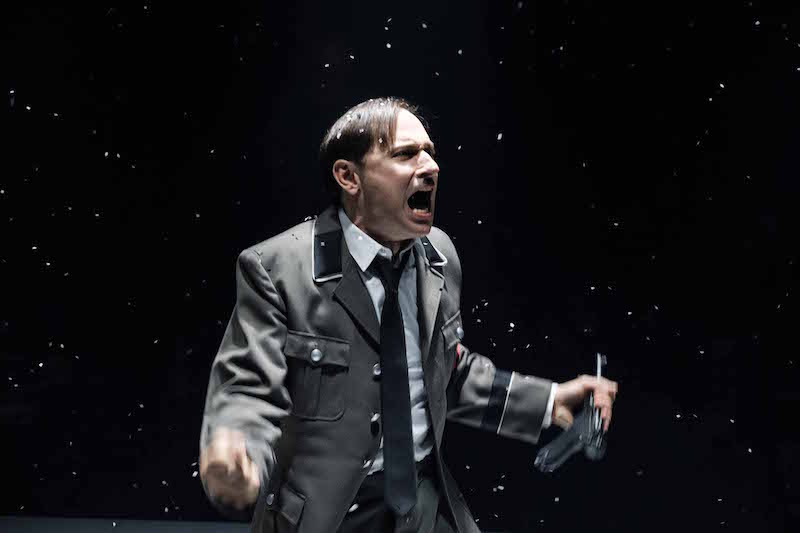Kings Cross Theatre, Sydney
June 20, 2018
The power of music is at the heart of Justin Fleming’s intellectually probing, frequently thrilling new play Dresden. Moving back and forth across a century, Fleming explores Richard Wagner’s music drama Rienzi, and the impact that it had on a young Adolf Hitler, who became consumed by it.
 Yalin Ozucelik as Adolf Hitler in Dresden. Photograph © Clare Hawley
Yalin Ozucelik as Adolf Hitler in Dresden. Photograph © Clare Hawley
The play opens with an elderly Wagner (Jeremy Waters) dictating his memoirs to his wife Cosima (Renee Lim). Looking back on his struggle as a young man to get Rienzi staged, we watch him beg the composer Giacomo Meyerbeer (Thomas Campbell) to examine the score in a vibrantly funny scene.
Thanks to Meyerbeer’s lobbying, the opera premiered in Dresden in 1842 and became Wagner’s first big success. It told the story of a 14th-century Italian leader who whipped up the crowds to restore Rome to its former glory, crushing the power of the nobles. But eventually the populace became disenchanted and turned on him, burning Rienzi and a few of his loyal supporters to death when they sheltered in the Capitol.
Seventy years after its premiere, the 17-year old Adolf Hitler saw the opera with his friend Gustl (Ben Wood) and in Fleming’s telling was so transfixed by what he had seen that he clapped and clapped long after anyone else in the audience.
Moving between eras, Fleming shows us Wagner dealing with the intransigent conductor Carl Gottlieb Reissiger and the flamboyant tenor Josef Tichatsheck who first played Rienzi but had no interest in the dramatic side of the role, or in any of it being cut despite the drastic edits needed. We then see Wagner being wooed by the young King Ludwig, and gradually developing his operatic career.
Meanwhile, Hitler fails to write his own libretto and instead becomes a politician. Visiting Cosima after Wagner’ s death to ask for the original manuscript of Rienzi, the opera remains a potent, liberating force in his mind as he undertakes his hideous, warped regime.
 Jeremy Waters as Richard Wagner in Dresden. Photograph © Clare Hawley
Jeremy Waters as Richard Wagner in Dresden. Photograph © Clare Hawley
By paralleling the two figures, Fleming explores what drives one man to creative genius and another to terrible destruction, suggesting that passion without love is at the crux. Wagner could never have written his Ring Cycle without the love of his wife Cosima, he tells us. Meanwhile, Gustl tries to get Hitler to see that his obsessive passion with Wagner’s myth is unhinged by his lack of humanity.
Fleming writes with a robust, frequently high-flown theatricality, the language swooping and soaring, full of dense ideas and deft humour. Meanwhile, the structure of the play is cleverly wrought, leading to Hitler’s final terrifying outpouring.
Suzanne Millar directs the play’s premiere for bAKEHOUSE Theatre Company, delivering a smart, assured production that moves swiftly and cleanly across its 70 minutes on the small performance area in the King’s Cross Theatre’s intimate, traverse setting. Patrick Howe has designed a slick, stylish set of black and white tiles, with a sunken floor, brought to life by Benjamin Brockman’s lighting.
Among a strong ensemble, Yalin Ozucelik gives a compelling performance as Hitler, avoiding obvious stereotype, while still capturing a vivid sense of the historical figure: no mean feat. Jeremy Waters is a warm, affable Wagner, with Thomas Campell and Dorje Swallow showing their flexibility in a range of roles.
And then, of course, there’s the music. Max Lambert has done an excellent job with the sound design, underscoring much of the action, and punctuating the drama with exhilarating blasts of Wagner’s score that soar to utterly thrilling effect, pointing, of course, to the legendary operas ahead.
Dresden runs at the Kings Cross Theatre until June 30











Comments
Log in to join the conversation.